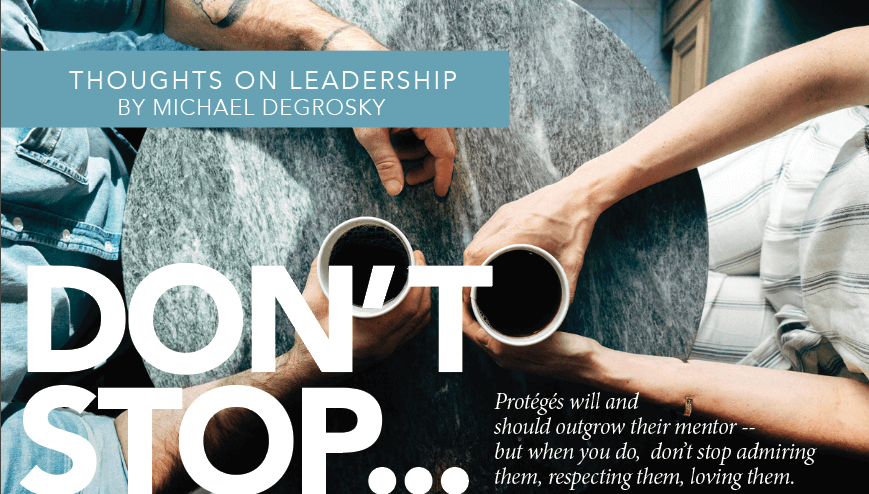 Protégés will and should outgrow their mentor — but when you do, don’t stop admiring them, respecting them, loving them.
Protégés will and should outgrow their mentor — but when you do, don’t stop admiring them, respecting them, loving them.
By Michael DeGrosky
Mentors are people who act as our confidants, serve as a sounding board, help us sort through difficult issues, help us learn things we would not learn on our own, find ways to bring out the best in us, whose advice we seek out before making a professional or personal move, who are there at important junctures in our lives and careers.
It wasn’t until recently that I realized why a good deal of the guidance on mentoring in the popular leadership press bugs me. So much of the available advice centers on relatively short-term, and somewhat transactional associations, often focused on what I would describe more as arrangements than relationships.
My mentors have been people with whom my relationships developed naturally and, often, those relationships were long-term. My associations with my mentors have been special ones; connections to people with whom I shared a bond; and I like to think that we enriched each other’s lives. Consequently, that’s my paradigm of mentoring; and I approach most opportunities to mentor a person as if the mentorship will become a mutually beneficial partnership and that it may eventually transition into a professional or personal friendship. Of course, it does not always work out that way, but the potential always exists.
My friends and colleagues who most cherish their mentors were mentored by people they admired and respected. I recently attended a conference in which a keynote speaker, a career fire chief, described his long-time mentor as a person he loved. I am an open-minded person, but that caused even me to sit up and take notice for a second. A middle-aged man, respected fire chief, stood there in a room full of his peers, almost exclusively middle-aged male, and used the word “love” to describe how he felt about his mentor. I found that so cool. We should all aspire to have at least one protégé who feels that way about us!
However, the Chief, despite his admiration, respect, love and gratitude for the chief who had mentored him, had eventually outgrown his mentor. And that’s important to understand: our protégés should outgrow us. Doing so means that they have done their job, you have done yours, and the work is done. It is also natural that, as we progress through our lives and our careers, that our needs change and our mentoring needs change as well. So, regardless of how much a mentor has shaped us, if successful, the mentor-protégé relationship will end — either by termination or by transitioning to another type of relationship.
Our protégés should outgrow us. Doing so means that they have done their job, you have done yours, and the work is done.
One can find countless articles about ending mentoring relationships and moving-on in the popular leadership press, but I find most lacking; mostly because they often come from the narrow perspective that that the mentee’s needs are no longer being met and that a breakup is needed. I really liked an article by John Greathouse that I once read in Forbes magazine. In From Mentor To Lifelong Friend – Here’s How You Do It (http://johngreathouse.com/you-are-never-too-old-or-too-successful-for-a-mentor/), Greathouse described how, as the mentoring relationship matures and the mentee succeeds, the relationship can evolve into a sustained friendship that enriches two people’s lives. The author described that evolution as the ultimate goal of any mentoring relationship, and I agree. Evolving from a mentor to a lifelong friend; that’s a worthy goal and a great outcome. Why would we not want to end up in that place with a person we respected and admired enough that we either asked them to mentor us or that we chose to mentor? However, not all mentoring relationships achieve that ultimate goal and the reality is that they end in a lot of ways for a variety of reasons; and, honestly, ending a mentoring relationship can be tough.
I am not talking about some corporate mentoring arrangement in which people are assigned to one another. I am talking about natural mentoring relationships in which two people have shared a journey involving trust; respect; admiration; reverence; closeness; and, yes, even love. Those, dear readers, are Big League emotions, often experienced over long periods of connection; and I am certain that is why so much of the leadership advice out there is couched in breakup language.
People choose to extinguish their mentoring relationships for all kinds of reasons. Either the protégé or mentor’s needs are not being met. The mentee has outgrown the mentor and a further evolution of the relationship is not in the cards. It turned out to be too much work. It’s not fun anymore. Someone gets let down.
So much of the advice for people whose mentoring relationship has run its course is written for mentees whose needs aren’t being met and is about breakup tactics and technique. Don’t end the relationship abruptly, pick a date. Plan a last meeting and your closure conversation. Tell them why you’re ending the relationship.
Remember, ditching your mentor can be bad for your career. End on a high note.
However, so much of this advice minimizes an important aspect. Mentors and their protégés are human beings and, without care, when people separate from other people with whom they’ve shared a bond, the awkwardness, hurt feelings, and sense of loss are very real and can be both difficult and long-lasting. So, some advice. Protégés will and should outgrow their mentor; but when we do, let’s remember why they were our mentors in the first place, and not stop admiring them, respecting them, even loving them.
+

Mike DeGrosky is Chief of the Fire Protection Bureau for the Montana Department of Natural Resources and Conservation, Forestry Division. He taught for the Department of Leadership Studies at Fort Hays State University for 10 years. Follow Mike on Twitter @guidegroup or via LinkedIn.
